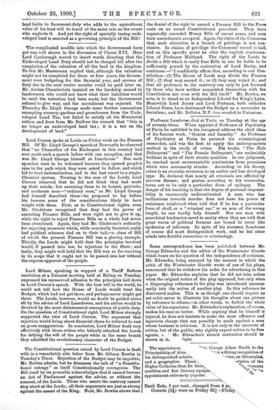Lord Curzon spoke at Leeds on Friday week on the
Finance Bill. Of Mr. Lloyd George's speech at Newcastle he observed that "no Chancellor of the Exchequer in this country had ever made such a speech before with one exception, and that was Mr. Lloyd George himself at Limehouse." But such speeches were to be welcomed because they opened people's eyes to the path which they were asked to follow, and which led to land nationalisation, and in the last resort to a single- Chamber system. Turning to the ease of the Lords, Lord Curzon observed that he did not think they had made up their minds; but assuming them to be honest, patriotic, and moderate men—" ordinary men," as Mr. Lloyd George had himself described them—he proposed to lay before his hearers some of the considerations likely to have weight with them. First, as to Constitutional rights, even Mr. Gladstone recognised that they had the power of amending Finance Bills, and were right not to give it up, while the right to reject Finance Bills as a whole had never been abandoned. Again, they had Mr. Gladstone's authority for rejecting measures which, while nominally financial, really had political schemes tied on to their tail,—a class of Bill of which the present Finance Bill was a glaring example. Thirdly, the Lords might bold that the principles involved would, if passed into law, be injurious to the State ; and lastly, they might well hold that the Bill was so far-reaching in its scope that it ought not to be passed into law without the express approval of the people.










































 Previous page
Previous page